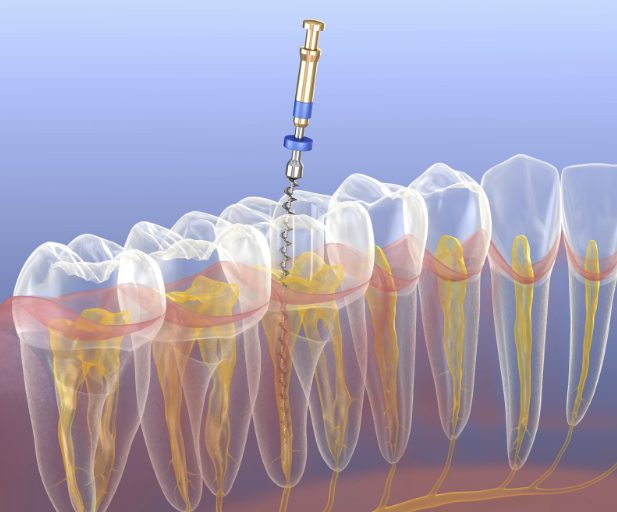Are you experiencing tooth pain or sensitivity while eating your favorite food? If yes, then it’s time to pay a visit to the dentist. One of the most effective treatments for deep cavities and root infections is root canal dentistry. But what is it exactly? In this blog, we will discuss everything you need to know about root canal treatment – from its benefits to how it works. We will also cover who needs this treatment and what to expect during the procedure. Additionally, we will provide information on recovery and follow-up care so that you can make an informed decision about your oral health. So read on to learn more about this highly-effective dental treatment!
What Is Root Canal Dentistry?
Root Canal Dentistry is a dental treatment that involves extracting damaged or infected pulp from inside a tooth to prevent the need for extraction and save the natural tooth. An endodontist usually performs this procedure, and it offers benefits like pain relief, infection prevention, oral health improvement, and preservation of natural teeth.
Who Needs Root Canal Treatment?
Root canal treatment is necessary when the dental pulp (inside the tooth) is infected or inflamed, causing severe pain, sensitivity to temperature, and swelling. A dentist will perform tests to diagnose it, but sometimes, a tooth may need root canal treatment even if there are no symptoms due to underlying damage.
Signs And Symptoms
If you experience severe tooth pain or swelling of the gums and are concerned about infected dental pulp, you may want to consider root canal therapy. This procedure can alleviate discomfort from deep cavities or previous dental work that has affected the tooth’s nerve. If you are experiencing sensitivity to hot and cold temperatures or other signs of inflammation in the affected area, consult with your dentist to see if endodontic treatment is right for you.
What To Ask Before Treatment
When visiting an endodontist for root canal therapy, make sure to ask the necessary questions to avoid any complications. Inquire about the dental procedure and its various stages involving pulp removal and filling with gutta-percha material. Also, consult with your dentist regarding treatment-related discomfort or pain management options like local anesthesia and ibuprofen. Lastly, dental implant restoration or permanent crown placement may be required after root canal therapy; hence ask about follow-up care and oral hygiene tips.
What to Expect During A Root Canal Procedure
During a root canal treatment, an anesthetic is used to numb the area around the affected tooth before making a small opening. The dentist or endodontist then removes the infected pulp from the root of the tooth and cleans out the canal using specialized tools. The cleaned canals are filled with gutta-percha, and a temporary filling is placed until a permanent restoration can be completed. Post-procedure discomfort is common but manageable with over-the-counter medication.
Before The Procedure
To ensure successful root canal treatment without further damage or reinfection of natural teeth after decay or periodontitis affecting the pulp chamber and resulting in swelling and discomfort; before the dental procedure; the affected tooth’s nerve check is done by an endodontist. Along with X-rays to identify germs’ spread, temporary filling until restoration with a permanent crown is done after the infected pulp’s removal. Antibiotics are prescribed for inflammation or pus before local anesthesia by an oral and maxillofacial surgery specialist for pain management.
During The Procedure
To begin a root canal therapy session, your dentist administers local anesthesia to numb your affected tooth’s surrounding area. They then make an opening at its top to reach its infected pulp. After removing this pulp and cleaning/disinfecting your tooth’s interior parts using gutta-percha and temporary fillings (if required), they seal your teeth with a crown or permanent restoration to avoid reinfection later on.
Antibiotics In Root Canal Therapy
In some cases, your endodontist or dentist might prescribe antibiotics before or after a root canal procedure to avoid or treat an infection. Antibiotics are often used alongside other treatments to guarantee effective root canal therapy. If used properly they can reduce the chance of complications related to the procedure. Your healthcare professional will evaluate the specific circumstances of your case before deciding whether antibiotics should be taken.
Follow-Up Care And Oral Health Maintenance
Following a root canal procedure, it is vital to prioritize oral health maintenance. Your dentist may prescribe pain medication or antibiotics to manage discomfort and prevent infection. Brushing twice a day and daily flossing are crucial for healthy gums and teeth. Regular dental check-ups and cleanings can detect potential issues early on and maintain optimal oral health.
Conclusion
Root canal dentistry can help save a tooth that would otherwise need to be extracted. It is a safe and effective procedure that can improve your overall oral health. If you are experiencing any of the symptoms mentioned, it’s important to schedule an appointment with your dentist as soon as possible to determine if root canal therapy is right for you. At the end of the day, it’s better to invest in root canal treatment than to wait until it’s too late and lose a tooth entirely. Take the first step towards better oral health by booking your appointment today with us at Camelot Dental Group!




